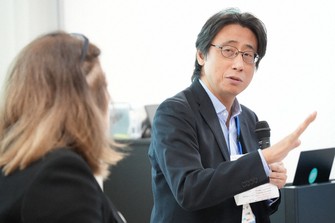
Sophia University professor Tamotsu Fujita speaks with a Japan representative of EF Education First about the significance of language study in the era of AI, in Tokyo’s Shibuya Ward on Nov. 13, 2024. (Mainichi/Buntaro Saito)
TOKYO — If AI-powered translation keeps advancing, it won’t be necessary to learn English: This sentiment has long been heard in Japan, as the country’s global ranking in English ability continues to tumble.
However, according to the director of Sophia University’s Center for Language Education and Research, and English education expert Tamotsu Fujita, “Even in the era of AI, language learning is meaningful.”
Before diving into why he thinks so, let’s review where English education in Japan stands in the latest international rankings. The 2024 grade by Switzerland-based study abroad company EF Education First (EF) is based on tests in 116 participating non-native-English speaking countries and regions.
Japan’s position has been on a descent since 2011. In 2024, it fell five places from 87th to 92nd. The scores among 18- to 25-year-olds were especially low, reportedly significantly under the overall average.
However, the number of test-takers by country used in the comparison is not clear, and EF stated, “It is also important to note that the target audience is people who are engaged in learning English.”
So, what meaning is there for English education in Japan during the AI era? Fujita, speaking with a Japan representative of EF at one of the company’s offices in a multi-use building in Tokyo’s Shibuya Ward, gave the example of how AI cannot teach you how to convey “the color of a leaf” in Cambodia, showing the depths of language study beyond what machines can provide.
“I am learning the Cambodian language (Khmer), and when I translated the expression for ‘the color of the leaves of a plant’ using a translator, I got a word that means ‘green.’ However, when I asked native speakers about the same thing, they said they use a different word,” Fujita explained.
Fujita said that the Cambodian people use a word equating to “blue” in English to describe foliage. “It seems mysterious when you think about it in English, but in our sense as Japanese people we can totally understand an expression like ‘The leaves are bluish,'” he said.
Fujita contended that there are lots of things you can’t understand by merely changing the expressions by machine. He said emphatically, “Learning how to perceive and think about culture and how to connect with others — that is where the significance and value of learning a foreign language lies.”
He also pointed out the danger of relying on machine translation. Fujita drew the example of how he was told that “big decisions are made in the smoke room,” throwing back to a slightly older era. “Even today, small talk while standing around outside of meetings can bring up new ideas and build relationships,” he said.
Fujita also touched upon the importance of being able to have detailed conversations without translation tools within the multinational teams found in many areas of technological development, stressing, “In this age of easy collaboration, real communication skills are essential. I imagine the lack thereof could lead to fairly large losses.”
Fujita said of Japanese people’s English skills, “If you ask me whether we’ve actually declined, I don’t think we have. Rather, Japan has stayed in place as other countries have gotten ahead.”
One of the factors noted by Fujita is the size of the domestic market in Japan, wherein companies don’t need to try breaking out internationally. As a result, young people tend to also feel that they don’t really need to go overseas. This reportedly became stronger during the coronavirus pandemic.
Additionally, Fujita emphasized, “What is important in the global society of the future is the ability to flexibly accept various values and cultures. If you just want to learn about other countries, you may be able to do so online.”
Fujita continued by noting, however, “Try actually living abroad yourself and experience being a minority. This alone will show you how you have been at an advantage. You could be a linguistic minority, or maybe a racial minority. At that point, what should you do and how should you do it to solve the problems, and what will be the issues? I think experiencing things for yourself is key.”
(Japanese original by Buntaro Saito, Tokyo City News Department)


AloJapan.com